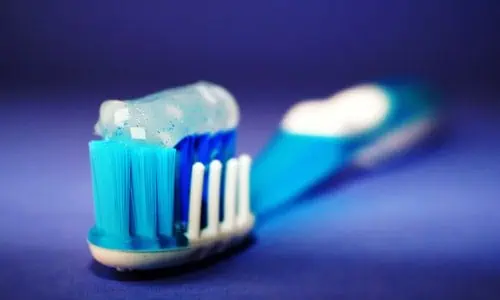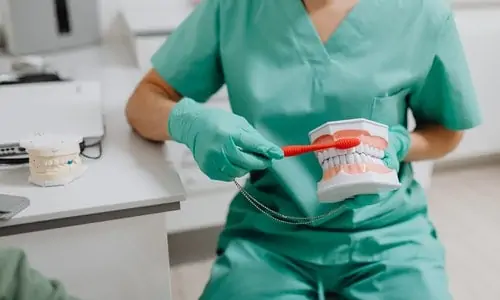Blog
Oral Health & COVID-19 Recovery

There have been close to 400 million cases of COVID-19 worldwide since the beginning of the pandemic. While one of the telltale signs of COVID can be loss of taste, among many other symptoms, there may be additional oral health concerns associated with a COVID-19 infection both during illness, as well as recovery. Your dentist in Douglasville is here to explain some potential oral health side effects of COVID-19.
Lesions or Ulcers
According to a study published in the Journal of Dental Research, over 80% of patients that were hospitalized with COVID-19 noticed lesions or ulcers in their mouths. Why would this happen as a result of respiratory disease? Well, the truth is, the respiratory system begins in the mouth and the nose, so it’s not uncommon for these areas to be affected. Keep in mind, ulcers should go away on their own. If they don’t schedule an appointment with your dentist in Douglasville. Besides ulcers and lesions, some patients also experience something coined “COVID tongue.” The symptoms of COVID tongue can range from loss of papilla (the teeny bumps on the tongue), enlarged tastebuds, or a burning taste or sensation.
Dry Mouth
Dry mouth is estimated to affect up to 65% of the population and is not a unique side effect of COVID-19. However, it can develop or become worse during or after infection. When we get sick with COVID, the virus can cause salivary glands to underproduce saliva. Healthy saliva flow is what allows our mouths to feel moist and comfortable, and it also helps reduce the risk of decay. Without enough saliva, the mouth may feel overly dry, you may experience bad breath, and you may be more likely to develop serious health problems such as gum disease. If you’re suffering from a dry mouth, drink lots of water every day, chew gum, and make sure to talk with your dentist in Douglasville.
Inflammation
One of the main concerns associated with COVID-19 is how the body responds to the infection, causing sometimes extreme levels of inflammation in certain parts of the body. This inflammation can also occur in the mouth. The gums are usually the most obviously affected, and COVID-19 long-haulers may notice red, swollen, and sometimes bleeding gums after recovery. It’s important to keep an eye on gum inflammation as it can also lead to or be a sign of gum disease. Gum disease does have connections to overall health and has been linked to an increased risk of heart disease, stroke, and respiratory disease. With that said, those with active gum disease when they become infected with COVID are more likely to have a serious case.
While some people find COVID-19 recovery simple, some of the 400 million people infected continue to experience long-term side effects. If you’re one of them and you have lingering oral health side effects, don’t hesitate to contact your dentist in Douglasville to schedule an appointment.
What Toothbrush Should I Use?

There are so many different kinds of toothbrushes to choose from, and while they may all look the same outside of the color, not all brushes work the same. In fact, there are some big differences between the types of toothbrushes available, and it can be difficult to know which one will be right for you. To help you find the perfect toothbrush to fit your oral health needs, check out this guide from your dentist in Douglasville.
The Bristles
One of the most important things to consider when deciding on which toothbrush to use is the bristles. When your dentist in Douglasville considers the bristles of a toothbrush, they look for two things – the shape and the density.
- Shape – Bristles are either straight or rounded, and this difference is sometimes very subtle, so make sure to look closely. Rounded bristles are usually recommended for most people as they’re effective at removing plaque and bacteria while also being gentle. Straight bristles, on the other hand, can cause gum or enamel damage, especially if you brush too hard.
- Density – Toothbrush packaging will also list information about how dense the bristles are. You’ll see this referenced as soft, medium, or hard. Most likely, your dentist in Douglasville will recommend that you use a soft-bristled toothbrush as opposed to a medium or hard. Soft bristles are gentle enough to get a thorough clean while not causing damage to your teeth or gums.
The Size
Sometimes, bigger is better. But not when it comes to your toothbrush. You don’t want a toothbrush that you can’t comfortably fit in your mouth or one that’s too difficult to manage. Look for a toothbrush that has an appropriately-sized head and handle. The head should be large enough to be able to brush two teeth at once but not too large that you can’t reach your back teeth.
The Cost
The cost of toothbrushes can vary greatly depending on a variety of factors. The most obvious is whether you’re looking to buy a manual toothbrush or an electric toothbrush. Electric toothbrushes and their replacement heads are often more expensive than manual toothbrushes. However, if you’re someone who finds manual toothbrushes difficult to use, an electric toothbrush may be recommended. Don’t worry though, there are now affordable electric toothbrushes that your dentist can recommend.
The ADA Seal of Approval
No matter if you choose a manual toothbrush or an electric toothbrush, make sure you look for the ADA Seal of Approval. Toothbrushes that have earned the seal have undergone testing to make sure they’re safe, durable, and won’t increase the risk of gum or enamel damage.
So, which toothbrush should you use? The one that you will pick up every morning and night and use for two minutes. However, we also want to make sure that your toothbrush isn’t doing more harm than good, so talk with your dentist in Douglasville about which toothbrush you typically use and see if they have any other suggestions for you based on your specific oral health needs.
The Benefits of Using an Electric Toothbrush

When it comes to brushing your teeth, it’s most important to your dentist in Douglasville that you do it twice a day. However, choosing which type of toothbrush to use can be confusing. While both electric and manual toothbrushes can get the job done, when it comes to keeping your teeth clean, there are some advantages to using an electric toothbrush.
- May Be More Effective
While the jury is still out on whether or not electric toothbrushes are officially better at removing plaque and bacteria, studies have shown that this just may be the case. Since electric toothbrushes pulse at such a fast rate, they can flush out hard-to-reach areas.
- A Two-Minute Timer
Your dentist in Douglasville recommends that everyone brush their teeth for two minutes every single time. This is best broken out into 30-second increments for each section of your teeth – the lower left quadrant, upper left quadrant, lower right quadrant, and upper right quadrant. However, it’s really easy to lose track of time and cut a brushing session short. Most electric toothbrushes have built-in timers to help guide you through a thorough, two-minute cleanse.
- Under Pressure
Many patients believe that the more they scrub their teeth the cleaner they’ll be. However, using too much pressure to brush your teeth can actually cause more harm than good. A tough scrub can weaken tooth enamel and also cause gum recession. Some electric toothbrushes have pressure sensors to keep you from brushing your teeth too hard.
- Easy To Use
Some people, such as those with mobility problems or arthritis, may find a traditional manual toothbrush too hard to use properly. However, with an electric toothbrush, the brush does most of the work for you so you can still get a good, clean mouth.
- Consistency is Key
Did you know that you may be using different levels of pressure to brush different areas of your mouth? In fact, it’s not uncommon to brush the first section of your teeth harder than that last section. An electric toothbrush can help keep a consistent pressure in all areas of your mouth, ensuring an even clean.
Some Disadvantages
It wouldn’t be fair if we didn’t also talk about some potential disadvantages to using an electric toothbrush, so let’s take a look at a few.
- Electric toothbrushes are more expensive than manual toothbrushes
- If you’re someone who travels a lot, some electric toothbrushes can be hard to pack
- They require regular charging which can be inconvenient for some people
- If you don’t use the toothbrush properly, it can damage your teeth and gums, just as a manual toothbrush can
Selecting the best toothbrush for you can seem intimidating, however, your dentist in Douglasville is here to help. Schedule an appointment today!
Is Fruit Good for Your Teeth?

Teeth are one of the most important aspects of your body and your overall health, and it’s essential to take care of them with good oral hygiene practices. This means regular brushing, flossing, and visiting your dentist in Douglasville twice a year. However, what you eat can also play an important role in keeping your teeth healthy and cavity-free. When it comes to fruit, could this healthy snack actually be bad for your teeth?
Sugar & Acid
Two of our teeths’ worst enemies are sugar and acid, and some of the most popular fruits contain high levels of both of these. When you eat foods that are high in sugars, even natural sugar like many fruits, bacteria in your mouth use those sugars to produce acid. This acid can weaken tooth enamel. Additionally, some fruits are both high in sugar and are naturally acidic, making them a double danger to teeth.
Signs of Weakened Enamel
When tooth enamel weakens, it leaves teeth at increased risk for decay and cavities. Some signs of weak enamel include:
- Sensitive Teeth
- Cracking
- Discoloration
- More Transparent Teeth
If you notice any of these symptoms, contact your dentist in Douglasville.
Best Fruits for Teeth
When searching for the best fruits that will give you a boost of valuable nutrients and protect your teeth, consider choices that have high water content, such as apples, melons, and pears. Another surprising beneficial fruit is strawberries. Even though they’re bright red and can stain, they contain malic acid, which has been shown to help whiten enamel.
Worst Fruits for Teeth
Some of the worst fruits for teeth are probably obvious as they’re citrusy and may even make you pucker when you eat them. Others may come as a surprise. Two of the worst fruits for teeth are lemons and pineapple. Both of these sour snacks are acidic and damage enamel. Another fruit that can also be bad for teeth is bananas. Although bananas pack a valuable nutritional punch, they’re also high in starch. Starch can linger around in the mouth and between teeth, encouraging bacteria development.
Fruit vs. Fruit Juice
When it comes to choosing to get your vitamins through fruit or fruit juice, your dentist in Douglasville will always recommend whole fruits over juice. Fruit juice, even fresh-squeezed juice, usually contains higher levels of sugar and acid compared to raw, whole fruits.
Eating fruit is a necessary part of a healthy diet, and you should incorporate it into your meals. To help protect your teeth in the process, enjoy acidic or super sugary fruits in moderation and rinse your mouth with water afterward.
What Are Tonsil Stones?

So you’ve probably heard of kidney stones, but what about tonsil stones? It’s actually a common condition that your dentist in Douglasville can help you understand a little bit more about. For some patients, tonsil stones are a recurring condition; for other people, they might never experience them in their lifetime.
Some Common Causes of Tonsil Stones
Stand in front of a mirror, open up, and say, “ah.” When you see the tonsils in the back of your throat, take note of all of the nooks and crannies. These are the perfect places for bacteria to hide out and become trapped. When this happens, the bacteria and debris can form tiny white tonsil stones as they harden over time. Some of the most common causes of why tonsil stones occur include a wide range of bacterial and viral infections such as:
- Streptococcus bacteria
- Adenoviruses
- Influenza virus
- Herpes simplex virus
- Enteroviruses
Tonsillitis: Understanding the Signs and Symptoms
Tonsillitis is generally caused by painful inflammation and swelling in your tonsils. However, there are some other symptoms you need to be on the lookout for if you or someone in your family has tonsil stones:
- Bad breath
- Frequent sore throats
- Earaches
- Trouble swallowing
You should also be mindful if you have an ongoing cough or persistent swelling. It’s best to see your doctor or dentist in Douglasville to get professional advice.
How Can You Prevent Tonsil Stones?
Chronic tonsillitis is the perfect match for tonsil stones. So, the best way to ensure you’re free from tonsil stones in the future is to consider having your tonsils removed. This is also known as a tonsillectomy and involves removing your tonsil tissue completely, so there’s no more inflammation and issues for you or your kiddo. Once you’re healed, you can take comfort in knowing you’ll never experience the discomfort of a tonsil infection or unwanted tonsil stones ever again!
Are you having trouble with tonsil stones? You can schedule an appointment at our dental office in Douglasville so we can talk with you about your experience and goals. We can work with you and your primary care physician to help you get rid of tonsil issues and stay healthy. Please call us to get started!
4 Ways to Straighten Your Smile

Did you know that crooked teeth can affect more than just your appearance? Teeth that are overlapped or crooked can affect your bite, make it difficult to properly clean your teeth, and even cause problems with digestion. But there’s good news — you don’t have to live with a crooked smile. In fact, your dentist in Douglasville can offer you ways to straighten your smile, without braces!
1. Tooth Recontouring
Adults who have minor misaligned teeth and who want a straighter smile can sometimes benefit from a simple tooth recontouring treatment. Tooth recontouring involves removing portions of the enamel in order to change the shape of your teeth.
2. Bonding
Another simple way to transform the appearance of your teeth is through a cosmetic dentistry treatment called bonding. Bonding is usually appropriate for one or two teeth that sit farther back than other teeth. Your dentist in Douglasville will apply bonding material to build up the tooth structure so it becomes aligned with the neighboring teeth.
3. Veneers
Dental veneers may also help straighten teeth that are a bit more overcrowded or crooked than those that can benefit from contouring or bonding. Veneers are thin slices of porcelain that are created to match the best shape, size, and color for your smile. Your dentist will remove a tiny portion of the front surface of your teeth to make room for the veneer, then affix the shell in place. This form of cosmetic dentistry can also cover up discoloration or smaller gaps.
4. Invisible Aligners
Patients who have crooked teeth that can’t be fixed through the other treatments may be a candidate for invisible aligners. These thin plastic aligners are worn every day and only removed to eat and brush your teeth. They can effectively move teeth into the desired position, similarly to traditional metal braces. While these revolutionary aligners can certainly transform a smile, they may not be appropriate for everyone. Talk with your dentist in Douglasville about whether clear aligners may be right for you.
Should You Straighten Your Teeth At Home?
While we’re talking about clear aligners, it’s important to mention the surge in at-home clear aligner treatment. However, straightening your teeth at home, either with these aligners or by trying to make your own braces, can result in some negative side-effects such as:
- Tooth decay
- Broken teeth
- A bad bite
- Pain in your jaw or teeth
It’s always best to talk with your dentist in Douglasville about any dental treatment before trying to treat it on your own.
Signs You May Need to Straighten Your Teeth
You may not know if crooked or overlapping teeth are affecting your overall health, but there are often some telltale signs that you will benefit from a smile straightening treatment including:
- Difficulty chewing
- Problems with speech
- Clicking jaw
- Top and bottom teeth don’t allow your jaw to close while at rest
- Mouth breathing
If you’re unhappy with your smile or notice any of the signs above, schedule an appointment with your dentist. You’ll talk about what’s bothering you and your dentist will perform an exam and possibly x-rays to get a better idea of what treatment may be the best way to straighten your teeth.
Do Teeth Get Better After Quitting Smoking?

According to the American Dental Association, quitting smoking has been shown to improve oral health in several important ways. Perhaps most importantly, your teeth and gums may become healthier. If you’re trying to kick the habit, join your dentist in Douglasville as we share some ways quitting can help improve your overall health and oral health.
Why Is Smoking Bad For Oral Health?
Most people know that smoking is bad for overall health, but did you know that it can be detrimental to oral health, too? Smokers have an increased risk of developing some serious oral health issues, such as:
- Gum disease
- Dry mouth
- Tooth discoloration
- Bad breath
- Tooth loss
- Oral cancer
Can You Reverse The Effects Of Smoking?
If you’re a smoker, you may feel that there is no point in quitting, especially if you’ve been smoking for a long time. However, your dentist in Douglasville has good news. Once you stop smoking, the risk of developing gum disease or oral cancer drops to non-smoker levels. This may take some time, but it’s well worth the health benefits. Additionally, the American Cancer Society showcases additional benefits to quitting smoking at any age such as lowering the risk of cancer and extending your life by 10 years.
How to Stop Smoking
Quitting smoking can be very difficult as it’s a highly addictive habit. But don’t lose hope. There are a number of ways people have successfully quit. It’s important to note that not every tip will work for everyone. Keep an open mind and keep trying alternatives.
- Pick a Quit Date
Some smokers may try to stop smoking “cold turkey,” meaning that one day they just stop. While this can work for some people, it’s incredibly difficult. Instead, professionals recommend picking a quit date and working your way to that quit date by decreasing the number of cigarettes you have a day.
- Find a Support System
Quitting on your own can make the process even harder, so try getting a support system. This can be a family member, friend, or perhaps even a coworker. Talk to them about how they can best help you and in ways that you will find most supportive.
- Supplement with Something Healthy
A lot of smokers have trouble quitting because of the simple act of holding something in between their figures or puffing on something throughout the day. If you find this to be the case, try to find a healthy alternative. For example, snack on vegetables, chew sugarless gums, hold a pencil in between your fingers, or consider a nicotine replacement product.
It’s incredibly important that everyone visits their dentist in Douglasville at least twice a year, but this is even more important for smokers. Regular visits help keep teeth and gums healthy and are a great opportunity to check for any signs of oral cancer or other problems. Usually, when a dental problem is caught early, treatment is more successful and easier.
Do Cavities Spread Like The Common Cold?

As we head into the cooler months, it’s normal to think about reducing the likelihood of you or your family getting the common cold, the flu, or of course, COVID-19. But should you also be concerned with catching a cavity? Are cavities contagious like a cold? Thankfully, your dentist in Douglasville has some answers.
Good & Bad Bacteria
All of us have a variety of different types of bacteria in our mouths. Some of these bacteria are good and can help keep mouths healthy. But there are also some bad bacteria, particularly Streptococcus mutans and porphyromonas gingivalis, that can lead to decay and cavities. So what does this have to do with cavities being contagious? We’re glad you asked.
Sharing Sometimes Isn’t Caring
Even though we all have bacteria in our mouths, we don’t necessarily all have the same types of bacteria. So when you come in contact with a new strain of bacteria, it can cause problems, and it’s most likely there to stay. What’s more, if you swap bacteria with someone and the person happens to have those bad bacteria, and you don’t, they can make their way into your mouth and create cavities. Some of the top ways you can transfer bacteria between people are:
- Sharing utensils
- Sharing a straw
- Biting off the same piece of food
- Kissing
- Using someone else’s toothbrush
The Concern With Kids
Kids are at increased risk for developing cavities through shared saliva. Kids don’t have as many types of bacteria in their mouths and their immune systems tend to be weaker than adults’, meaning that any new bacteria that enters their system can make them more likely to get a cavity or two. In fact, the transmission of bad bacteria is most common between parents and kids.
Protect Yourself, Protect Others
Unfortunately, there’s no way for you to know if you’re transmitting bad bacteria to someone else or if they may be transmitting them to you. However, you can do your part to reduce the risk.
- Brush and floss your teeth regularly
- Don’t share forks, spoons, straws, or toothbrushes
- Drink plenty of water to keep your mouth hydrated
- See your dentist in Douglasville at least twice a year
Regular dental checkups can not only help protect your teeth from developing cavities, but they can also help catch any other problems early. If it’s longer than six months since your last dental visit or dental cleaning, schedule an appointment with your dentist in Douglasville today.
What’s it Mean When Your Dental Benefits Expire?

Dental insurance can be an amazing tool, but that doesn’t mean you should wait until the last minute to use it. If you don’t get in to see your dentist in Douglasville before your benefits expire, you could miss out on potentially life-changing treatment. While each policy will be different, it’s worth checking your specific insurance to see whether your benefits expire at the end of the year. If so, schedule an appointment with your dentist before December!
Maximums
One of the most important parts of dental insurance is making sure you know your yearly maximums. A maximum is the total amount of dental benefits insurance plans offer each year. Typically, these range from about $1,000 to $1,500 a year. As always with insurance, there are probably some limitations as to what services you can use that money for. But either way, if you don’t use the maximum amount allowed to you as part of your plan, you will lose it when your benefits expire.
Deductibles
Another aspect of many dental insurances is a deductible. If your plan has a deductible, it means you must pay for a certain dollar amount of treatment before your insurance kicks in. Some patients end up paying their deductible and never take advantage of the dental benefits. Essentially, this is money lost.
Covered Treatments
One of the more confusing parts about dental insurance is what treatments are covered and how much of each treatment is covered by insurance. Sometimes insurance covers preventive care at 100% and portions of some additional services such as cosmetic dentistry. This is where your dentist in Douglasville can help you maximize your insurance benefits for the care you need and want
Prevention is Best
You’ve probably heard that prevention is the best medicine. We agree, especially when it comes to dental care. The best way to maximize your dental benefits is to see your dentist regularly and at least every six months for preventive care. Many dental problems can sneak up on us and may not even have any symptoms until the problem is serious (and sometimes costly). However, preventive dental appointments can help catch potential problems early when treatment is often easier — on your and your wallet.
We understand that dental insurance can be confusing. After all, they’re all different. But they do all have one thing in common — the benefits expire. Don’t let your hard-earned dental benefits go to waste. Call to schedule an appointment with your dentist in Douglasville today.
5 Tips to Help You Recover from Wisdom Teeth Removal

Wisdom teeth are the last teeth to erupt in your mouth. But unfortunately, many times these teeth need to be removed. Your dentist in Douglasville may recommend wisdom teeth extractions if there’s not enough room in your mouth for them to erupt without damaging other teeth or if they’re coming in crooked or sideways. While it’s natural to feel a bit uneasy about any surgery, wisdom teeth removal is usually a fairly straightforward procedure. However, there are some restrictions to what you can do post-surgery so that you can heal quickly and properly. Follow these five tips to help you fully recover, without causing further damage or pain.
- Take It Easy
Depending on the type of anesthesia used, you may feel a bit groggy after your procedure, so it’s crucial that you take it easy for a few days. During this time, avoid activities like bending over, lifting heavy objects, or doing strenuous activities. These can increase blood flow and cause the surgical site to bleed more and swell up. Avoid exercise for about 3-4 days or until your Douglasville dentist gives you permission.
- Keep Ice On The Area
Swelling after having your wisdom teeth removed is normal, but we encourage you to do your best to keep it under control by using ice packs. Gently apply ice packs to the sides of your cheeks as much as possible during the first three days. A good rule of thumbs is to keep the ice on for 20 minutes, keep it off for 20 minutes, then repeat. Don’t apply ice directly to your skin, always make sure there’s some sort of barrier in place. An important note: swelling may increase a few days after surgery then subside.
- Control Bleeding
Bleeding after having a tooth extracted is normal, but there are things you can do to help reduce it. To control bleeding at home, your dentist in Douglasville will recommend that you gently bite down on gauze in the areas of extraction. This pressure can help stop the bleeding. Make sure to wash your hands before handling putting the gauze in and taking it out so that bacteria isn’t introduced into your mouth.
- Eat Soft Foods
Following wisdom teeth surgery, you may be tempted to go back to eating normally. However, you should eat a soft food diet for a few days. This means forgoing crunchy veggies, crackers, nuts, and anything else that might put pressure on your gums or cheek muscles. Instead, snack on things like:
- Soup
- Yogurt
- Applesauce
- Scrambled Eggs
- Oatmeal
Also, avoid eating or drinking anything that’s really hot, super spicy, or acidic.
- Drink Plenty of Water
One of the most important things to remember during recovery is to stay hydrated. This means increasing your daily intake of water. Water will help flush out your mouth and keep your throat moisturized after surgery. To help reduce swelling, you can also gargle gently with warm saltwater. However, remember to avoid using straws. The sucking action can loosen blood clots that are an essential part of healing.
Remember, your dentist will only recommend wisdom teeth surgery if it’s necessary to keep your mouth healthy. While you may have some minor pain and discomfort after the procedure, it should be temporary, and you should be healed in no time. However, if the pain doesn’t go away or the bleeding doesn’t stop, call your dentist in Douglasville for more information.
